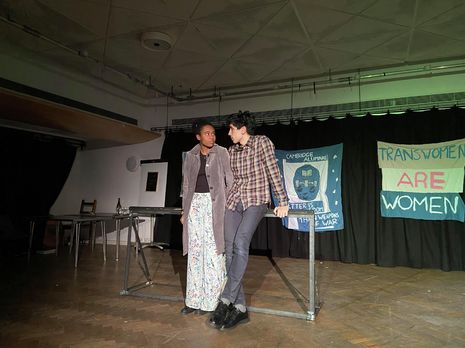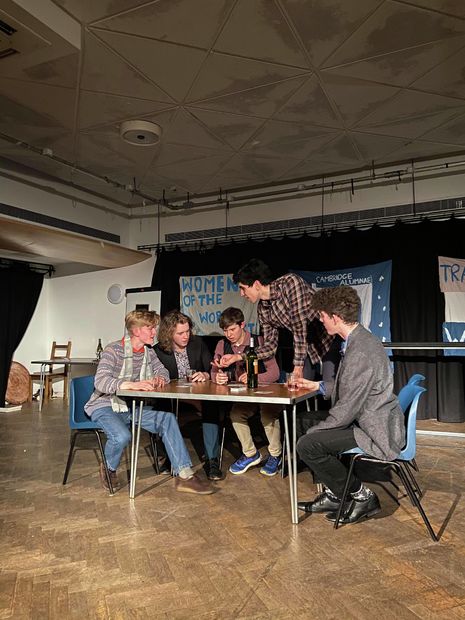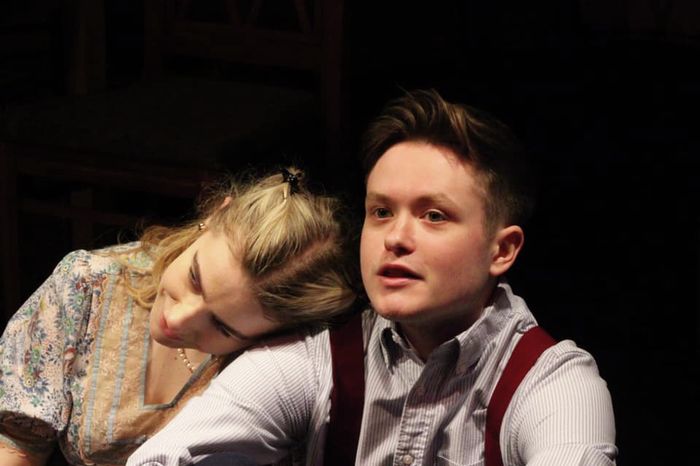Blue Stockings is well-conceived but tonally confused
Iris Pearson wishes this well-acted and sometimes brilliant production had a better sense of itself

Jessica Swale’s Blue Stockings, first performed at the Globe in 2013, depicts a Cambridge that the students here today can hardly imagine. It shows a university buoyed up by masculine superiority: determined to keep women out. The female protagonists at Girton are patronised, derided and thrown out of lectures as they fight for the woman’s right to knowledge, and the female student’s right to graduate. Annika Hi, Florence Sharkey and Giulia Armiero’s production in Pembroke New Cellars has its moments of brilliance and hilarity, but it falls in a space between comedy and chilling realism which leaves the audience wondering exactly how to react.
The male students’ horror at seeing a woman riding a bicycle in Cambridge, or their sniggering nervousness when sitting opposite girls in the library can easily be portrayed as ridiculous and therefore comic. Edmund Wilson as Lloyd is particularly hilarious as he bumbles and attempts to belittle the female students, and the pointless drinking game which the five men play, where singing a sweet ballad is the punishment for losing, is a perfect example of ludicrous behaviour at which the audience cannot help but laugh. Yet there are other scenes in which the male reaction to female students is not comic but disturbing: Rohan Mitta’s performances, both in the opening sequence and as Maudsley, are driven by a contorted misogynist logic which is almost terrifying to watch; Mitta commands the stage both verbally and physically with such chilling power that the audience are captivated, but also shrinking in our seats. Each of these interpretations of the men’s reaction to women, represented by Wilson and Mitta respectively, would be valid approaches to this play, but the combination of both gives the play a lack of continuity. It feels confused, and a little undecided. I think this production could be tightened if the directors and actors agreed on a tone and a desired effect on the audience: and pursued it relentlessly through the whole play.

Perhaps what this production lacked was a little more polish, something I certainly felt at the end of scenes. The opening sequence was one of my favourites: the abstract, physical theatre-esque, Cabaret-stern-young-women juxtaposition worked brilliantly as the backdrop to Mitta’s speech against women in higher education; the movements were sharp but also flowing, assertive but silent (credit goes to Charis Taplin as Movement Director). I think it worked fantastically as an abstract introduction to the power dynamics between men and women in this institution. But the scene’s force was immediately undercut by a lengthy (and noisy) scene transition which unfortunately distracted the audience’s attention and interrupted the just-established momentum. I would have liked to see a sharper ending and slicker transition here, as at a number of points in the play, to carry through the emotion and momentum which these talented actors have built up during the scene; too many scenes ended on a down-beat, which was a shame to see after so much hard work.
It falls in a space between comedy and chilling realism which leaves the audience wondering exactly how to react.
Speaking of talented actors, praise is due to Maya McFarlane (Tess) and Emily Rose James (Celia) in particular for their performance of the scene in the orchard, where Tess is writing love poetry instead of revising for her exams. Their conversation is dynamic, virtuoso, negotiating pacier and more subdued exchanges; between them they manage pretty perfectly the tonal shifts and the rising conflict until Celia drops off into pleading: "Don’t throw this away, Tess. Not when it’s only just started". McFarlane, James and Lydia Makrides (Carolyn), alongside William Hu (as Radleigh) and Jasper Cresdee-Hyde (as Mr Peck) are wonderful in the examination scene, running through complex physics with impressive fluency and endearing confidence and maintaining the scene’s pace so that the audience can hardly pause for breath before the emotional ending.
Swale’s ‘Blue Stockings’ tells a necessary story in the development of our university, and Hi, Sharkey and Armiero, armed with a talented group of actors, do a commendable job of bringing it to life in this Pembroke Cellars production. With a little more polish, and some firmer decisions about tone – chilling or comic? disturbing or ridiculous? – this promises to be an important piece of theatre about the fight for knowledge and the sacrifices that come with it.
 Features / Are you more yourself at Cambridge or away from it? 27 January 2026
Features / Are you more yourself at Cambridge or away from it? 27 January 2026 News / Vigil held for tenth anniversary of PhD student’s death28 January 2026
News / Vigil held for tenth anniversary of PhD student’s death28 January 2026 Interviews / Lord Leggatt on becoming a Supreme Court Justice21 January 2026
Interviews / Lord Leggatt on becoming a Supreme Court Justice21 January 2026 News / Reform candidate retracts claim of being Cambridge alum 26 January 2026
News / Reform candidate retracts claim of being Cambridge alum 26 January 2026 Comment / How Cambridge Made Me Lose My Faith26 January 2026
Comment / How Cambridge Made Me Lose My Faith26 January 2026










